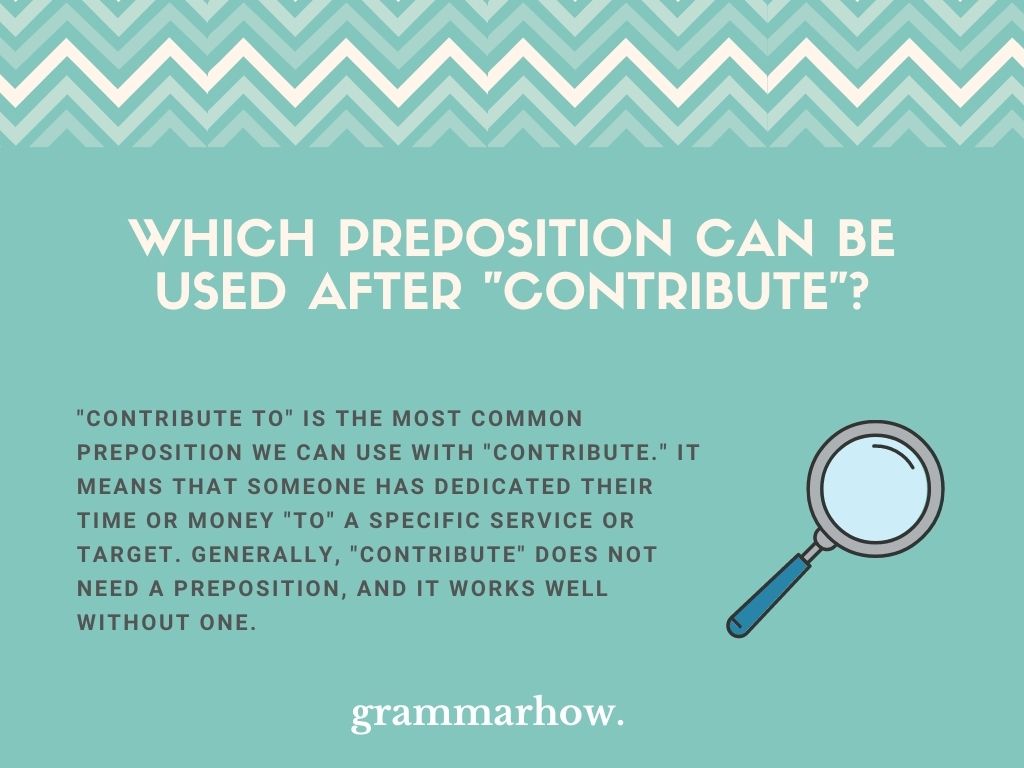The word “contribute” doesn’t always come with a preposition. However, when it does, it helps us to understand which ones work best. This article will explain the correct prepositions you can use with “contribute” and how they differ.
Which Preposition Can Be Used After “Contribute”?
“Contribute to” is the most common preposition we can use with “contribute.” It means that someone has dedicated their time or money “to” a specific service or target. Generally, “contribute” does not need a preposition, and it works well without one.

To help you understand why “contribute” isn’t the best choice for prepositional phrases, we can refer you to the following examples. We won’t include any prepositions, and you’ll see that the meaning still holds up.
- Thank you to those who contributed their money to my cause.
- I appreciate all who contributed their time to get my business up and running.
- Thank you for what you contributed.
As you can see, we do not use prepositions in any of the above examples.
However, just because they’re not all that common doesn’t mean they’re not correct. As we’ve stated, “to” is a great preposition to use with “contribute,” and it looks like this:
- I appreciate anyone who contributed to helping me figure this project out.
- Thank you for contributing to getting me through college.
There aren’t many other useful choices (besides “on”), so we should only stick with “To” when it needs to be shown.
How Prevalent Is The Use Of The Different Prepositions?
It might help you to see some statistics to understand how uncommon it is to use prepositions with “contribute.” You’ll notice just how popular “to” is in all cases.
According to Google Ngram Viewer, “contribute to” is the only acceptable preposition to use with the word. We use it whenever someone has given something toward a service or goal. There are no other correct prepositions in this graph.

We included “on,” “in,” and “for” in the above graph to show you some comparisons. They have very limited uses in the graph because they are not common. Only “on” is another correct variation that we can use in certain cases.
For the most part, you should either use “contribute” on its own or “contribute to,” depending on whether you’re talking about the overall goal. There is generally no reason to use any of the other prepositions.
Examples Of How To Use “Contribute To” In A Sentence
So, let’s look at the only real prepositional choice we have here. “Contribute to” works well in many cases, and it would help to understand when it shines from the examples below.
- I would like to contribute to your goal if you’re happy to take my donation.
- He has contributed to my target, which is exactly the amount I needed to finish it.
- Thank you to those of you who have contributed to making sure this place runs smoothly while the manager is away.
- Your contribution to the cause will not be forgotten, and we’re so grateful for you and your family.
- This contribution to the hospital will go a long way in helping all the sick and needy to get the things they want.
- I would like to contribute to this project because it’s something I hold very dear to my heart.
- She contributed to the project overall, though she didn’t seem to want to take any credit for it when asked.
“Contribute to” works whenever we want to show that someone has spent time or money and given it to a goal. We use it to show that someone committed a selfless act to help another person or group, and their contribution was a great help in the long run.
Also, we could replace “to” with “toward,” as the two prepositions have identical meanings. “Toward” is just a slightly more old-fashioned version of “to,” which is why it’s not all that common.
- Thank you for contributing toward this project.
Examples Of How To Use “Contribute On” In A Sentence
“Contribute on” is not common at all. However, that does not mean it’s incorrect. There are a few specific cases where we might see it used correctly. The following examples will showcase this.
- Thank you for your contribution on the topic we discussed early.
- I would like to contribute on this matter if you’re happy to hear me.
- I think you should contribute more on what the group says.
- I would like to contribute on why we need more public libraries in this area.
- You should contribute on the discussion while it’s been carried out.
“Contribute on” only works when we are talking about a discussion or debate. We use it when someone has contributed their ideas or information that might have been useful to the overall topic, though “contribute to” still works in these cases as well.
What Does “Contribute” Mean?
While it’s great to know what prepositions work well with “contribute,” it isn’t much use if we don’t know what the word means. So, we’ll refer you to the definition that we can use for the word here.
“Contribute” means to give something to help someone else achieve a goal. Usually, this contribution is money or time-related, and it’s often done through the selflessness of the person. We can use it whenever donations or contributions are made to aid others.
The definition of “contribute,” according to The Cambridge Dictionary, is “to give something, especially money, in order to provide or achieve something together with other people.”
“Contribute” – Synonyms
Now let’s check out some alternatives that might be useful for you. If you aren’t too keen on using “contribute,” or you’d just like to expand your vocabulary, any of these are great choices to replace it.
- Give
- Donate
- Gift
- Make a donation
- Put up
- Come up with
- Play a part in
- Have a hand in
- Be a factor in
- Be instrumental toward
- Help
All of these synonyms are useful to use in place of “contribute” in many contexts. Choose your favorite and start playing around with them to see which works best for you.

Martin holds a Master’s degree in Finance and International Business. He has six years of experience in professional communication with clients, executives, and colleagues. Furthermore, he has teaching experience from Aarhus University. Martin has been featured as an expert in communication and teaching on Forbes and Shopify. Read more about Martin here.
